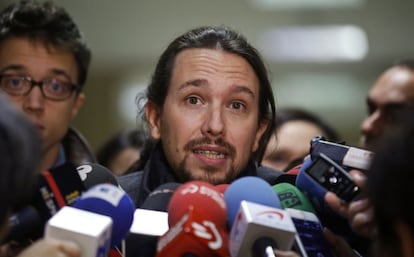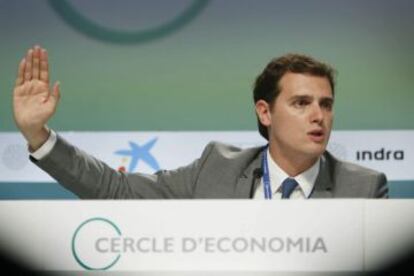Podemos refuses to back deal between Socialists and Ciudadanos
Anti-austerity leader Pablo Iglesias says the emerging parties’ policies are incompatible


Podemos leader Pablo Iglesias said on Monday that he will not support an alliance between the Spanish Socialist Party (PSOE) and emerging group Ciudadanos, “either actively or passively.”
The head of the anti-austerity party, who has been seeking an alliance of his own with the Socialists in which he would personally become deputy prime minister, said he is not willing to endorse a pact of this nature.
“It was Ciudadanos who said explicitly that they would not support a government with Podemos in it” - Pablo Iglesias
“We are ready to talk to everybody,” said Iglesias on Monday, shortly before meeting with King Felipe VI as part of the protocol ahead of the investiture vote. “It was Ciudadanos who said explicitly that they would not support a government with Podemos in it.”
Instead, Podemos’s leader is asking Sánchez to choose between himself and Ciudadanos chief Albert Rivera, because their two platforms “are incompatible.”
Iglesias insisted on his own proposal for a “government of change” comprising the Socialists, Podemos and the United Left. The idea has met with considerable opposition from high-ranking Socialist officials, however, because of Podemos’s support for a Catalan referendum on self-rule.
With Spanish politics in gridlock following inconclusive elections in December that yielded a hung parliament, parties have been scrambling to forge alliances for a working government coalition – or, failing that, to secure enough support for a “yes” vote at the upcoming investiture session to name a new prime minister.

But the incumbent Mariano Rajoy, whose Popular Party (PP) obtained 123 seats on December 20, has been unable to muster enough backing to get himself reinstated and attempt to form a minority government.
In fact, Rajoy is declining to be a candidate at the investiture session altogether, but is also refusing to step aside to let another PP official have a try.
In the meantime, his Socialist rival Pedro Sánchez has been working on a draft document that could be the basis for an alternative governing alliance.
Sánchez wants to reach out to Spain’s two new national parties, Podemos and Ciudadanos, but also to the United Left and to regional groups in the Basque Country, Catalonia, the Canary Islands and elsewhere.
Both Podemos and Ciudadanos burst onto the national scene in recent years, surging ahead in voter opinion polls on similar messages of change for Spain. But while the latter favors pro-market policies, the former began as a Syriza-sympathizing group that has since shifted to the center-left to attract more moderate voters.
English version by Susana Urra.
Tu suscripción se está usando en otro dispositivo
¿Quieres añadir otro usuario a tu suscripción?
Si continúas leyendo en este dispositivo, no se podrá leer en el otro.
FlechaTu suscripción se está usando en otro dispositivo y solo puedes acceder a EL PAÍS desde un dispositivo a la vez.
Si quieres compartir tu cuenta, cambia tu suscripción a la modalidad Premium, así podrás añadir otro usuario. Cada uno accederá con su propia cuenta de email, lo que os permitirá personalizar vuestra experiencia en EL PAÍS.
¿Tienes una suscripción de empresa? Accede aquí para contratar más cuentas.
En el caso de no saber quién está usando tu cuenta, te recomendamos cambiar tu contraseña aquí.
Si decides continuar compartiendo tu cuenta, este mensaje se mostrará en tu dispositivo y en el de la otra persona que está usando tu cuenta de forma indefinida, afectando a tu experiencia de lectura. Puedes consultar aquí los términos y condiciones de la suscripción digital.








































